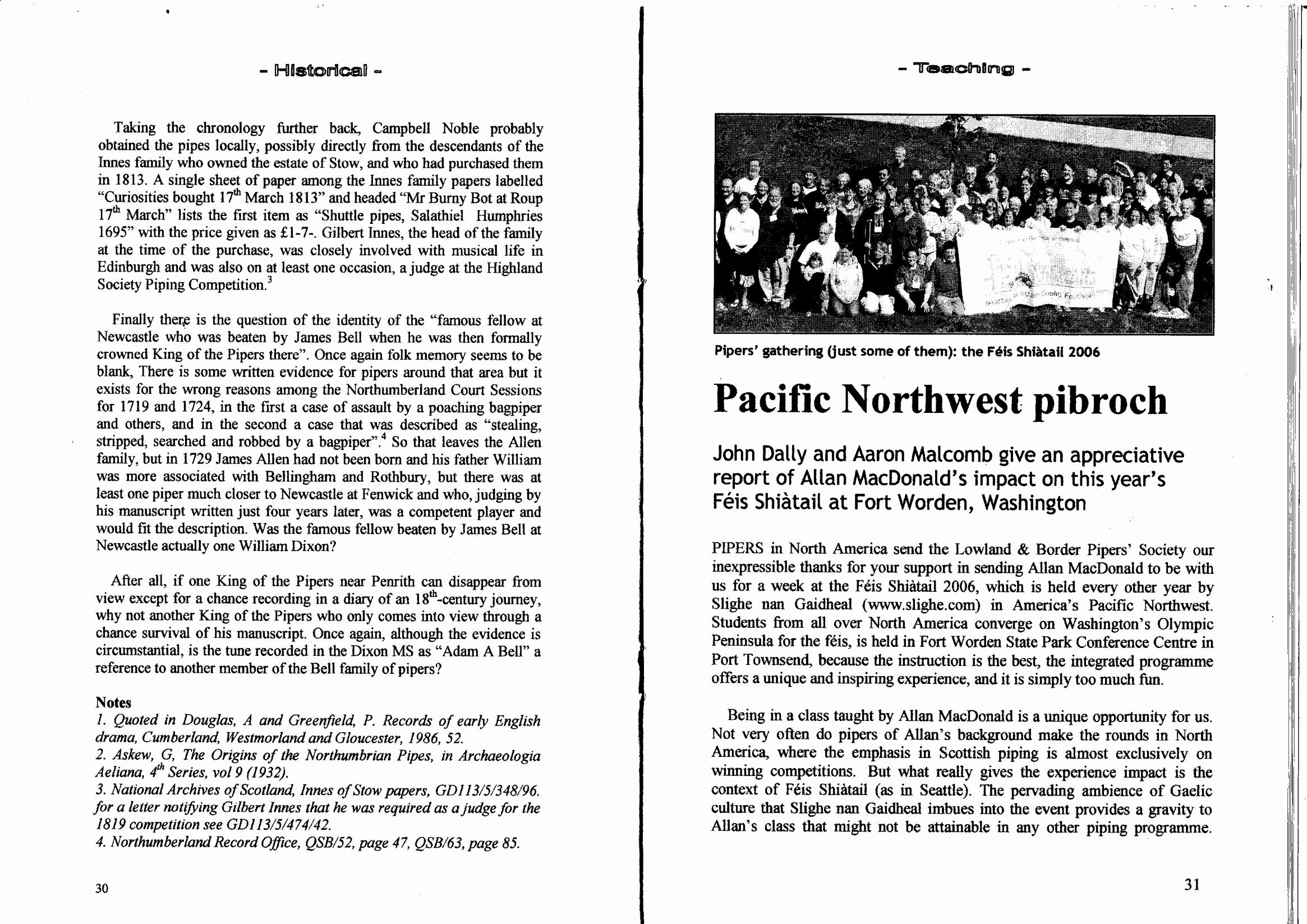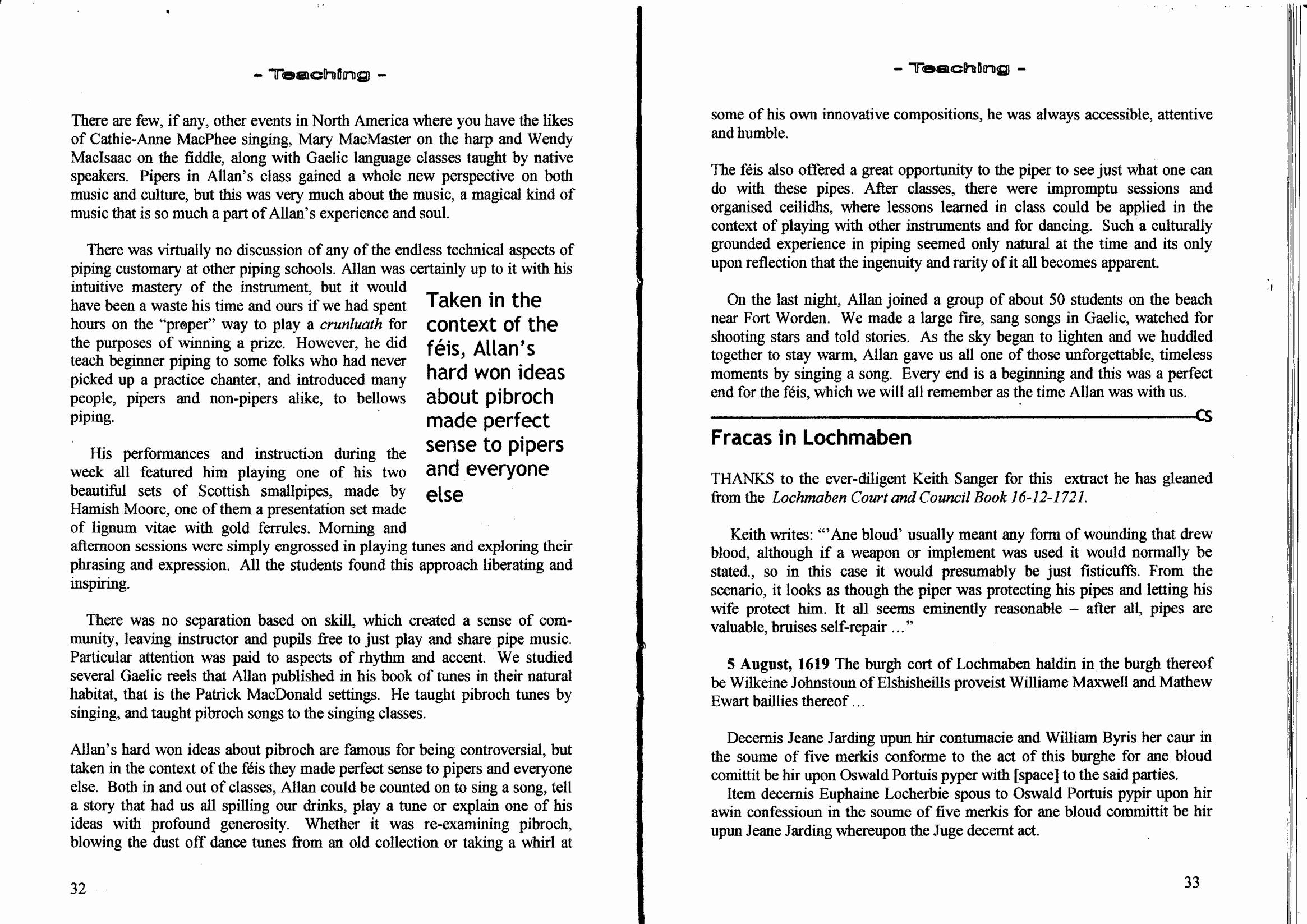Pacific Northwest Pibroch


John Dally and Aaron Malcomb give an appreciative report of Allan MacDonald’s im- pact on this year’s Fèis Shiataii at Fort Worden, Washington.
PIPERS in North America send the Lowland & Border Pipers’ Society our inexpressible thanks for your support in sending Allan MacDonald to be with us for a week at the Fèis Shiataii 2006, which is held every other year by Slighe nan Gaidheal (www.slighe.com) in America’s Pacific Northwest. Students from all over North America converge on Washing- ton’s Olympic Peninsula for the feis, is held in Fort Worden State Park Conference Centre in Port Townsend, because the instruction is the best, the integrated programme offers a unique and inspiring experience, and it is simply too much fun.
Being in a class taught by Allan MacDonald is a unique opportunity for us. Not very often do pipers of Allan’s background make the rounds in North America, where the empha- sis in Scottish piping is almost exclusively on winning competitions. But what really gives the experience impact is the context of Feis Shiataii (as in Seattle). The pervading ambience of Gaelic culture that Slighe nan Gaidheal imbues into the event provides a gravity to Allan’s class that might not be attainable in any other piping programme.
There are few, if any, other events in North America where you have the likes of Cathie- Anne MacPhee singing, Mary MacMaster on the harp and Wendy MacIsaac on the fiddle, along with Gaelic language classes taught by native speakers. Pipers in Allan’s class gained a whole new perspective on both music and culture, but this was very much about the music, a magical kind of music that is so much a part of Allan’s experience and soul.
There was virtually no discussion of any of the endless technical aspects of piping customary at other piping schools. Allan was certainly up to it with his intuitive mastery of the instrument, but it would have been a waste his time and ours if we had spent hours on the “proper” way to play a crunluath for the purposes of winning a prize. However, he did teach beginner piping to some folks who had never picked up a practice chanter, and intro- duced many people, pipers and non-pipers alike, to bellows piping.
His performances and instruction during the week all featured him playing on of his two beautiful sets of Scottish smallpipes made by Hamish Moore, one of them a presentation set made of lignum vitae with gold ferrules. Morning and afternoon sessions were simply engrossed in playing tunes and exploring their phrasing and expression. All the students found this approach liberating and inspiring.
There was no separation based on skill, which created a sense of com-munity, leaving instructor and pupils free to just play and share pipe music. Particular attention was paid to aspects of rhythm and accent. We studied several Gaelic reels that Allan published in his book of tunes in their natural habitat, that is the Patrick MacDonald settings. He taught pibroch tunes by singing, and taught pibroch songs to the singing classes.
Allan’s hard won ideas about pibroch are famous for being controversial, but taken in the context of the fèis they made perfect sense to pipers and everyone else. Both in and out of classes, Allan could be counted on to sing a song, tell a story that had us all spilling our drinks, play a tune or explain one of his ideas with profound generosity.
Whether it was re-examining pibroch, blowing the dust off dance tunes from an old collection or taking a whirl at some of his own innovative compositions, he was always accessible, attentive and humble.
The feis also offered a great opportunity to the piper to see just what one can do with these pipes. After classes, there were impromptu sessions and organised ceilidhs, where lessons learned in class could be applied in the context of playing with other instruments and for dancing. Such a culturally grounded experience in piping seemed only natural at the time and its only upon reflection that the ingenuity and rarity of it all becomes apparent.
On the last night, Allan joined a group of about 50 students on the beach near Fort Worden. We made a large fire, sang songs in Gaelic, watched for shooting stars and told stories. As the sky began to lighten and we huddled together to stay warm, Allan gave us all one of those unforgettable, timeless moments by singing a song. Every end is a beginning and this was a perfect end for the fèis, which we will all remember as the time Allan was with us.
